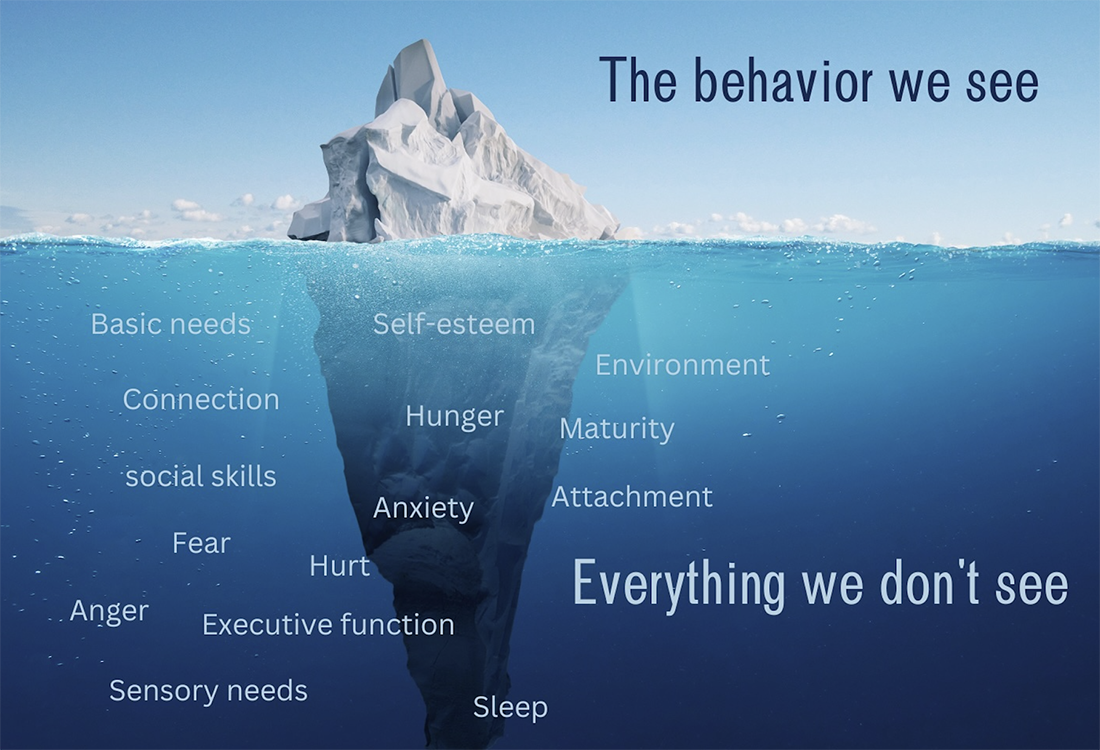When my first child entered the toddler years, our days became filled with intense emotions and big tantrums. Navigating this new phase without losing my temper was a daily challenge. I found myself trying to “fix” my child’s behavior and falling into the trap of thinking, “Why is my child giving me such a hard time?” which only seemed to make things worse. Sound familiar?
The Iceberg mindset finally helped me shift my perspective and get through these challenging years of early parenthood. Think of unwanted behavior as the tip of an iceberg. What you see on the surface—the tantrums, defiance, or whining—is only a tiny part of what’s happening. Underneath it lies the root cause: an unmet need, a mistaken belief, or a nervous system struggling to regulate itself.
Most of us inherit traditional parenting approaches that focus solely on what’s visible—controlling our child’s behavior. However, a behavior is merely a symptom. Real change happens when we address the underlying belief, emotion, or need behind the behavior, thus gaining our children’s cooperation in the short term and fostering their long-term emotional resilience and self-regulation.
Let’s say you’re having nightly bedtime battles, and your child keeps getting out of their bed. You might be tempted to offer a reward for staying in bed or impose a consequence for getting out. This can be a temporary fix, but the root cause of the behavior, such as separation anxiety, fear of the dark, or a need for more connection, remains unresolved.
Instead, what if we asked, “What’s going on for my child? How was their day? What’s preventing them from falling asleep comfortably and safely?” Maybe they need more connection at the end of the day, or perhaps their sleep environment isn’t conducive to rest. By addressing the need, rather than forcing the desired behavior, we’re more likely to find a solution that works for both child and parent.
Rewards and consequences only address behavior on the surface. Over time, they can drain us as parents and erode our relationship with our children. In contrast, when we adopt the “iceberg mindset,” we become more compassionate, curious, and ultimately more effective in parenting. Instead of focusing on how to stop or punish a behavior, we get curious and ask relevant questions to uncover what’s truly going on for our child.
Let’s say your child is refusing to do their homework. They might be lacking connection and are settling for your attention. They might be asserting their increasing need for autonomy and agency. They might be hurt by you and trying to hurt you back unconsciously. Or they might not be doing their homework because they don’t believe they can do it. Different interventions are effective for different root causes.
At the core of this approach is the belief that children do well when they feel well. When we try to connect with our children and understand what’s happening beneath the surface of their behavior, we build a lifelong foundation of trust and empathy. Ultimately, we become more effective at guiding them and creating a more joyful and loving relationship.
In some instances, it isn’t easy to know the why behind the behavior in the heat of the moment, which is OK. It is still important to trust that we, as parents, can help our children by being fully present and helping them feel safe and regulated. In time, the true cause will emerge, allowing us to work toward solutions together.
Most importantly, whether we find the root cause behind our children’s behavior or not, let us remember their innate goodness. “My child isn’t giving me a hard time; they’re having a hard time.”
Disclaimer: All blog articles and contributions are thoroughly vetted before release to ensure they are aligned with OMS policies, neutrality of nature, non-political, non-religious, and non-discriminatory. OMS reserves the right to refuse blog contributions that are not aligned with our standards, guidelines, philosophy, and principles.


